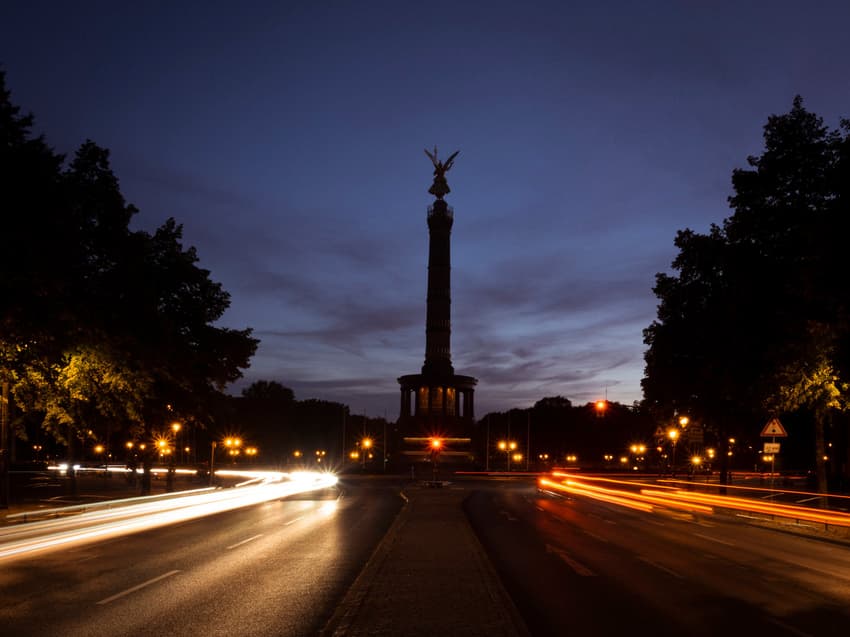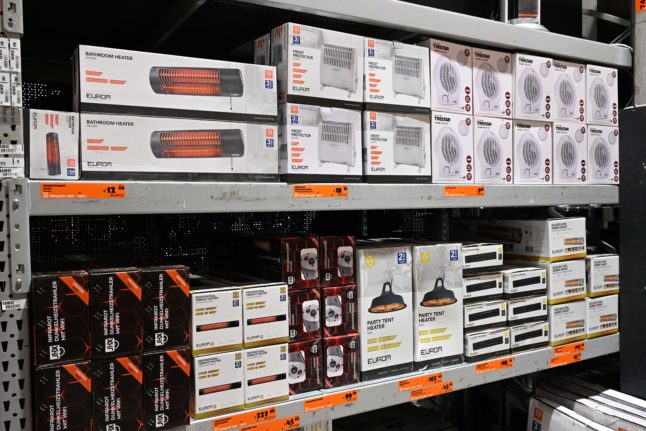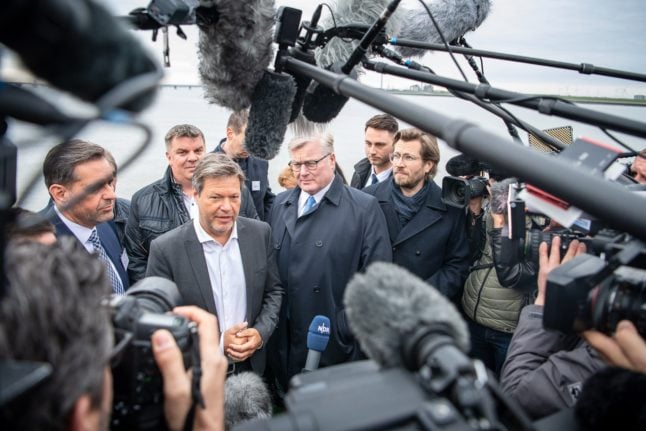OPINION: Germany has failed to do its energy 'homework' - and faces years of catching up

Germany's energy crisis is the result of decades of failing to take action - and now residents face tough times. Brian Melican looks at what went wrong and asks why Germany isn't doing more to become energy independent given the scale of the problem.
One of the most common figures of speech in German political debate is “doing one’s homework”. “Da hat die Politik mal wieder ihre Hausaufgaben nicht gemacht!” – “Once again, the politicians haven’t done their homework!” – is the usual refrain when something has gone quite predictably awry. Part and parcel of day-to-day politics in Germany, in other cultural spheres, this accusation is considered insufferably patronising. During the Euro crisis of 2012, for instance, the Greeks grew tired of being told, like petulant teenagers, to “go away and do (their) homework”. So it’s hard to begrudge them their audible Schadenfreude now that the self-styled schoolmaster has been caught with a briefcase full of unmarked essays.
While the details of the current energy crisis into which Germany has manoeuvred itself are technically complex – turbines and export permits; prolonging the service life of nuclear reactors or even recommissioning them; adjusting the amount of gas-generated electricity in the grid to varying degrees between north and south – the overall picture is so simple that every schoolchild can understand it: we have been putting off our homework for too long.
READ ALSO: Energy crisis to labour shortage: Five challenges facing Germany right now
Years of inaction
The assignment was set long ago. Back in the late 1990s, climate change first hit the political agenda and the Kyoto Protocol bound signatories to reduce greenhouse emissions. What's more, Germany, as a country with few natural resources but a large industrial economy, has long been dependent on in importing astronomical amounts of oil and gas from foreign regimes – an approach whose weaknesses started to become apparent in the Oil Crises of the 1970s. As such, the task was clear – to radically reduce our dependency on fossil fuels – and the student understood the learning objectives: contribute to saving the planet and gain a degree of strategic freedom.
We got off to a good start in 1998 by, for the first time ever, electing the Greens, who promptly proclaimed the Energiewende (green energy transition) and set about creating Europe’s leading solar and wind power industry. Unfortunately, however, the Chancellor they were under was SPD-man Gerhard “Greenhouse gasses? Russian gas!” Schröder and, in the background, industrials were assured that they wouldn’t have to take all the ecological stuff too seriously.

Gerhard Schröder hugs Vladimir Putin at a meeting in Moscow in 2018. Photo: picture alliance/dpa/TASS | Alexei Druzhinin
Then, in 2005 we elected Chancellor Merkel – and re-elected her three times on a more or less explicit platform of Keeping Everything The Way It Is. This could only be achieved by continuing to import fossil fuels – an ever increasing proportion of which came, in spite of the many clear and pressing dangers, from Russia – and shrinking our renewables sector so that money could still be lavished on tax breaks for motorists and nobody’s view would be spoiled by wind farms.
Now, the due date for our homework has come around and we have a serious crisis. Things, for the first time ever, can no longer be Kept The Way They Are: public buildings are no longer being heated/cooled, swimming pools are being shut, and monuments are not being lit; those of us on gas heating (i.e. the majority of households in Germany) will soon be paying anything from double to quadruple our current bills.
READ ALSO: Reader question - Should I modernise my heating system in Germany?
Everywhere we look, there are shortages: not enough gas means, in anti-wind-power southern Germany, not enough electricity too. Yet sales figures from DIY chain stores show skyrocketing sales of electric heaters; shutting public buildings reduces consumption there, but increases it in people’s homes… Like a schoolboy on Sunday evening counting and re-counting the hours, whichever way we divide our time, there’s not enough of it.

Electric heaters are among the many heating devices lining store shelves right now, like these on display in a Hornbach Baumarkt in Fröttmaning Photo: picture alliance/dpa | Felix Hörhager
What’s astonishing, by the way, is not actually how bad things have got – and how bad they’re looking this autumn and winter – but rather that they aren’t already far worse. This is primarily due to Economics Minister Robert Habeck’s decisive early action and brutally honest communication: as a result, we have been unexpectedly successful in reducing dependency on Russian gas from 55 percent to 35 percent within four months and have, due to various comparatively painless efficiency savings, managed to cut our gas consumption by 14 percent compared to last summer. As such, the Federal Network Agency is now cautiously optimistic that, if this winter is not a particularly cold one, we may just about make it through without having to shut off the gas supply to swathes of our industry or whole cities.
This may sound like a national success story – and if we are indeed successful in maintaining this thin, increasingly wobbly veneer of normality into 2023, there will be a strong temptation to sell it as such, patting ourselves on the back for having been far-sighted enough to switch off the hot water in town halls across the country before it was too late and then allowing ourselves to get distracted. Yet depriving civil servants of warm water to wash their hands during some of the hottest months on record while half of them are on holiday anyway (Why wasn’t this already standard practice?!) does not a green energy transition make. It is the equivalent of writing the last line on that essay just as the bus pulls into the stop opposite the school.
READ ALSO: Cold showers to turning off lights: How German cities are saving energy ahead of winter
Winter is first obstacle of many
Any short-term successes must be put in the context of a mountain of uncompleted tasks in the medium term. Firstly, getting through this winter by the skin of our teeth will mean that gas stocks are even lower next April than they were this year. So we’d better hope that those liquefied natural gas terminals being rush-built on the coast are operational by then, and that Qatar – that oh-so reliable regime thousands of miles away on the Persian Gulf that totally shares all of our values – honours the contracts Robert Habeck managed to grovel us into earlier this year.

Robert Habeck, Minister for Economic Affairs and Climate Protection, takes part in a boat tour for liquefied natural gas imports to Germany earlier in 2022 in Wilhelmshaven. Photo: picture alliance/dpa | Sina Schuldt
We’d also better hope that the Suez Canal, through which tankers filled with the much-needed LNG will need to pass, remains open the whole time and that Russian submarines sneaking their way through the Bosphorus don’t generate “incidents at sea”; then there’s Putin’s air units stationed in Syria… After that, in 2024, we’ll also need to keep a close eye on the US elections: another chunk of the LNG planned to replace Russian gas is from across the Atlantic, and a second Trump Administration would probably be only marginally more reliable a supplier than Putin’s regime.
So despite the flurry of activity this summer and the understandable angst ahead of autumn, it’s not really this winter that we should be worried about. There is, quite simply, a massive disconnect between the monumental scale of action which would be required to make Germany truly energy independent and the diminutive dimensions of what is currently happening.
Right now, we should be making it a legal requirement for landlords to switch heating systems from gas and legislating for state-funded factories to meet the demand this would generate; we should be immediately reactivating some of the thousands of kilometres of freight tracks Deutsche Bahn has dismantled in recent years – and drafting laws to make hauliers use these rail connections. Instead, we are jerry-rigging up LNG terminals and mucking about with flash-in-the-pan €9 tickets while we continue subsidising car-drivers enormous sums to burn petrol.
Oh, and given that – who could have guessed? – Russia is barely respecting its supply commitments anyway, we should finally do the decent thing and stop importing Russian gas now. Would that add to our dire predicament? Yes. But perhaps, in order for us to start taking our homework seriously, we need to learn a few lessons first.
READ ALSO: OPINION: How many massacres will it take for Germany to turn off Russian gas?
Comments (2)
See Also
One of the most common figures of speech in German political debate is “doing one’s homework”. “Da hat die Politik mal wieder ihre Hausaufgaben nicht gemacht!” – “Once again, the politicians haven’t done their homework!” – is the usual refrain when something has gone quite predictably awry. Part and parcel of day-to-day politics in Germany, in other cultural spheres, this accusation is considered insufferably patronising. During the Euro crisis of 2012, for instance, the Greeks grew tired of being told, like petulant teenagers, to “go away and do (their) homework”. So it’s hard to begrudge them their audible Schadenfreude now that the self-styled schoolmaster has been caught with a briefcase full of unmarked essays.
While the details of the current energy crisis into which Germany has manoeuvred itself are technically complex – turbines and export permits; prolonging the service life of nuclear reactors or even recommissioning them; adjusting the amount of gas-generated electricity in the grid to varying degrees between north and south – the overall picture is so simple that every schoolchild can understand it: we have been putting off our homework for too long.
READ ALSO: Energy crisis to labour shortage: Five challenges facing Germany right now
Years of inaction
The assignment was set long ago. Back in the late 1990s, climate change first hit the political agenda and the Kyoto Protocol bound signatories to reduce greenhouse emissions. What's more, Germany, as a country with few natural resources but a large industrial economy, has long been dependent on in importing astronomical amounts of oil and gas from foreign regimes – an approach whose weaknesses started to become apparent in the Oil Crises of the 1970s. As such, the task was clear – to radically reduce our dependency on fossil fuels – and the student understood the learning objectives: contribute to saving the planet and gain a degree of strategic freedom.
We got off to a good start in 1998 by, for the first time ever, electing the Greens, who promptly proclaimed the Energiewende (green energy transition) and set about creating Europe’s leading solar and wind power industry. Unfortunately, however, the Chancellor they were under was SPD-man Gerhard “Greenhouse gasses? Russian gas!” Schröder and, in the background, industrials were assured that they wouldn’t have to take all the ecological stuff too seriously.

Then, in 2005 we elected Chancellor Merkel – and re-elected her three times on a more or less explicit platform of Keeping Everything The Way It Is. This could only be achieved by continuing to import fossil fuels – an ever increasing proportion of which came, in spite of the many clear and pressing dangers, from Russia – and shrinking our renewables sector so that money could still be lavished on tax breaks for motorists and nobody’s view would be spoiled by wind farms.
Now, the due date for our homework has come around and we have a serious crisis. Things, for the first time ever, can no longer be Kept The Way They Are: public buildings are no longer being heated/cooled, swimming pools are being shut, and monuments are not being lit; those of us on gas heating (i.e. the majority of households in Germany) will soon be paying anything from double to quadruple our current bills.
READ ALSO: Reader question - Should I modernise my heating system in Germany?
Everywhere we look, there are shortages: not enough gas means, in anti-wind-power southern Germany, not enough electricity too. Yet sales figures from DIY chain stores show skyrocketing sales of electric heaters; shutting public buildings reduces consumption there, but increases it in people’s homes… Like a schoolboy on Sunday evening counting and re-counting the hours, whichever way we divide our time, there’s not enough of it.

What’s astonishing, by the way, is not actually how bad things have got – and how bad they’re looking this autumn and winter – but rather that they aren’t already far worse. This is primarily due to Economics Minister Robert Habeck’s decisive early action and brutally honest communication: as a result, we have been unexpectedly successful in reducing dependency on Russian gas from 55 percent to 35 percent within four months and have, due to various comparatively painless efficiency savings, managed to cut our gas consumption by 14 percent compared to last summer. As such, the Federal Network Agency is now cautiously optimistic that, if this winter is not a particularly cold one, we may just about make it through without having to shut off the gas supply to swathes of our industry or whole cities.
This may sound like a national success story – and if we are indeed successful in maintaining this thin, increasingly wobbly veneer of normality into 2023, there will be a strong temptation to sell it as such, patting ourselves on the back for having been far-sighted enough to switch off the hot water in town halls across the country before it was too late and then allowing ourselves to get distracted. Yet depriving civil servants of warm water to wash their hands during some of the hottest months on record while half of them are on holiday anyway (Why wasn’t this already standard practice?!) does not a green energy transition make. It is the equivalent of writing the last line on that essay just as the bus pulls into the stop opposite the school.
READ ALSO: Cold showers to turning off lights: How German cities are saving energy ahead of winter
Winter is first obstacle of many
Any short-term successes must be put in the context of a mountain of uncompleted tasks in the medium term. Firstly, getting through this winter by the skin of our teeth will mean that gas stocks are even lower next April than they were this year. So we’d better hope that those liquefied natural gas terminals being rush-built on the coast are operational by then, and that Qatar – that oh-so reliable regime thousands of miles away on the Persian Gulf that totally shares all of our values – honours the contracts Robert Habeck managed to grovel us into earlier this year.

We’d also better hope that the Suez Canal, through which tankers filled with the much-needed LNG will need to pass, remains open the whole time and that Russian submarines sneaking their way through the Bosphorus don’t generate “incidents at sea”; then there’s Putin’s air units stationed in Syria… After that, in 2024, we’ll also need to keep a close eye on the US elections: another chunk of the LNG planned to replace Russian gas is from across the Atlantic, and a second Trump Administration would probably be only marginally more reliable a supplier than Putin’s regime.
So despite the flurry of activity this summer and the understandable angst ahead of autumn, it’s not really this winter that we should be worried about. There is, quite simply, a massive disconnect between the monumental scale of action which would be required to make Germany truly energy independent and the diminutive dimensions of what is currently happening.
Right now, we should be making it a legal requirement for landlords to switch heating systems from gas and legislating for state-funded factories to meet the demand this would generate; we should be immediately reactivating some of the thousands of kilometres of freight tracks Deutsche Bahn has dismantled in recent years – and drafting laws to make hauliers use these rail connections. Instead, we are jerry-rigging up LNG terminals and mucking about with flash-in-the-pan €9 tickets while we continue subsidising car-drivers enormous sums to burn petrol.
Oh, and given that – who could have guessed? – Russia is barely respecting its supply commitments anyway, we should finally do the decent thing and stop importing Russian gas now. Would that add to our dire predicament? Yes. But perhaps, in order for us to start taking our homework seriously, we need to learn a few lessons first.
READ ALSO: OPINION: How many massacres will it take for Germany to turn off Russian gas?
Join the conversation in our comments section below. Share your own views and experience and if you have a question or suggestion for our journalists then email us at [email protected].
Please keep comments civil, constructive and on topic – and make sure to read our terms of use before getting involved.
Please log in here to leave a comment.